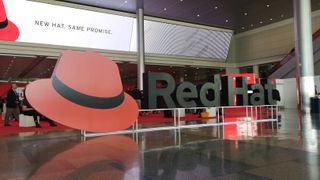View from the airport: Red Hat Summit 2019
Red Hat shows a $34 billion acquisition and an annual tech showcase do not mix well

Red Hat's 2019 summit was particularly memorable, largely because it will be the last conference it will host as an independent company. Despite being one of the largest and most important acquisitions in tech, let alone the software industry, the topic was somewhat of an elephant in the room throughout its week-long Boston show.
That's not to say it wasn't mentioned. In fact, IBM chief Ginni Rommetty took the stage during Red Hat's main keynote to discuss that very merger, only in very loose terms. However, aside from that 15-minute exchange, you would be forgiven for thinking it was business as usual for Red Hat.
The reluctance was understandable given that the $34 billion deal had only received approval from the US Department of Justice just days prior, and had yet to secure backing from European authorities. Executives were reluctant to talk about the merger as a result, and refused to answer press questions.
However, what they did say was that Red Hat would remain an independent entity under IBM. That's very important for a company like Red Hat, beyond the idea that remaining independent would make things simpler for its customers. As one of the major players in enterprise open source, Red Hat has built its reputation on being the "Switzerland of tech", modelling its own company on the industry it supports.
That puts the company in a bit of an awkward position, particularly as just last year Red Hat's senior vice president Werner Knoblich claimed that the fact it had avoided being acquired was one of its "key value propositions".
"If years ago HP or IBM had acquired us, we would have lost our neutrality. The ecosystem's other players know this as well, as open source is an innovation engine," he told us. Oh boy, that statement has not aged well.
The saving grace for Red Hat, and potentially the reasoning behind the deal, is that IBM is eager to scale up Red Hat's portfolio and make its Enterprise Linux OS (RHEL) and its OpenShift platforms the standard for open source. Red Hat boasts over 50,000 customers on RHEL alone, and of the $35 trillion revenues that Linux is expected to be part of in 2019, $10 trillion of that will come from RHEL.
Get the ITPro. daily newsletter
Receive our latest news, industry updates, featured resources and more. Sign up today to receive our FREE report on AI cyber crime & security - newly updated for 2024.
If IBM is content with simply pumping money into open source and taking a step back, then this deal could be great for customers, but given the scale of the deal, it seems unlikely that IBM will be completely hands-off.
Acquisition aside, there was little in the way of actual news. The launch of RHEL 8 was perhaps its biggest showcase, yet everything else felt like business as normal. Even the much celebrated Microsoft partnership with OpenShift, which allows users to access Red Hat's container platform through Azure, was already public knowledge given its beta test last year.
To some extent, Red Hat's annual summit came at an unfortunate time. The company is in a holding pattern until the IBM deal is finalised, and until then it's unable to make any major plays. Unfortunately, we have to wait until 2020's summit in San Francisco to see the first major test of the company under its new management.
Dale Walker is the Managing Editor of ITPro, and its sibling sites CloudPro and ChannelPro. Dale has a keen interest in IT regulations, data protection, and cyber security. He spent a number of years reporting for ITPro from numerous domestic and international events, including IBM, Red Hat, Google, and has been a regular reporter for Microsoft's various yearly showcases, including Ignite.





